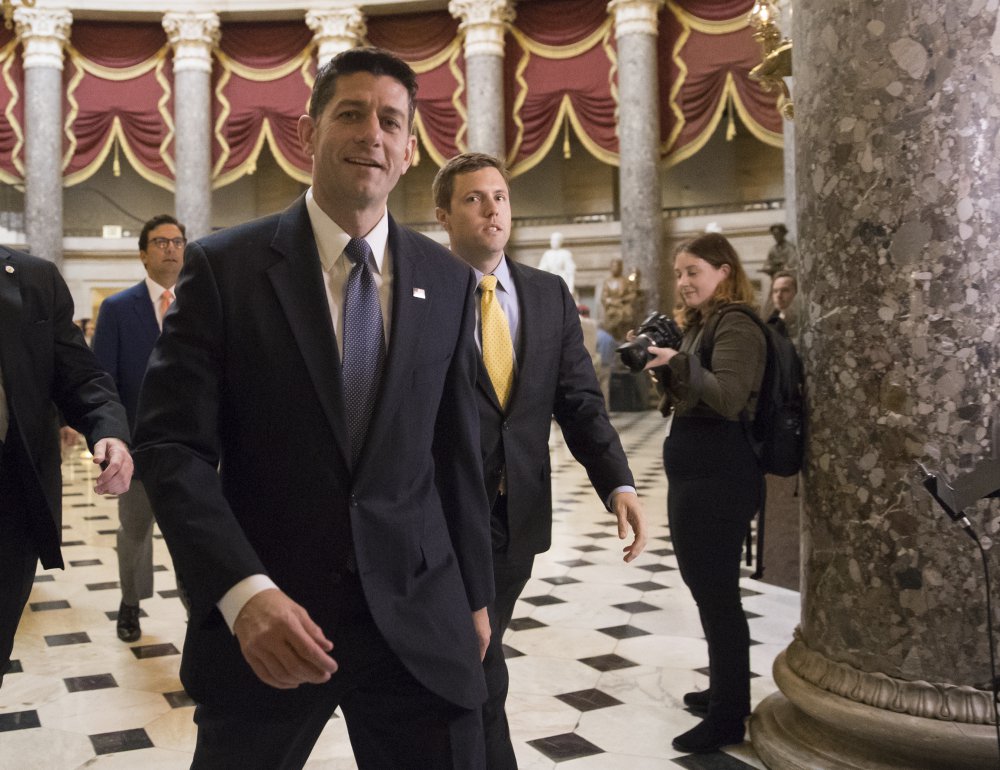WASHINGTON — Republicans set an aggressive timeline for passing legislation to overhaul the nation’s tax code, putting pressure on senior lawmakers and the White House to resolve major disagreements about the effort before a deadline to introduce a bill next Wednesday.
In a sign of the challenge to come, House Republicans narrowly passed a budget measure Thursday, 216-212, allowing the tax overhaul to increase the deficit by $1.5 trillion over a decade. The effort succeeded with support from only two lawmakers to spare, as a group of northeastern Republicans opposed the budget resolution because of concerns that the tax rewrite could hurt their constituents.
Rep. Bruce Poliquin, a Maine Republican, voted to pass the budget measure, and Rep. Chellie Pingree, a Maine Democrat, voted against it.
The Wednesday deadline sets up what is likely to be several days of intense lobbying to shape the tax overhaul bill. The House and Senate aim to pass legislation by Thanksgiving, with the goal of finalizing the bill and sending it to President Trump by year’s end.
“It shows the strength of the willingness to get tax reform done,” House Majority Leader Kevin McCarthy, R-Calif., said of Thursday’s vote.
But as they rush forward, lawmakers have not resolved basic questions about how the tax overhaul would affect the wealthy, the middle class or lower-income earners. Still unresolved were several questions: whether the legislation would moderate the expected benefits for the wealthy; whether it would cap or eliminate popular middle-class tax breaks such as the state and local tax deduction or the tax benefit of 401(k) retirement plans; and how dramatically it would expand a child-care tax credit that helps working-class families. Also on the table were several critical questions about how the corporate tax code would change.
Lawmakers planned to spend the coming days trying to resolve those concerns, with hopes that they would avoid the kind of interparty squabbles that have doomed other major legislative efforts this year. They also hoped to avoid unexpected criticism from Trump, who has railed against Republican hopes of overhauling the 401(k) provision.
House Ways and Means Committee Chairman Kevin Brady, R-Texas, the head of the House Republican effort to draft legislation, said that after he introduces a bill Wednesday, his committee will swiftly move to refine it and make changes before voting on it and sending it to the full House.
With the budget behind them, Republican lawmakers can no longer put off answering a host of thorny questions. There are deep divisions over which taxes or deductions to eliminate to offset some of the trillions of dollars in revenue lost to proposed steep tax cuts for corporations and some individuals.
Options to raise revenue have been met with stiff resistance. A Republican proposal to eliminate or scale back a deduction that allows individuals to deduct state and local taxes from their federal payment turned into a major sticking point in Wednesday’s budget vote. Twelve Republicans from the high-tax states of New York, New Jersey and Pennsylvania, where many voters stand to be hit hard if the deduction were eliminated, voted against the budget.
The “no” votes came after a week of scrambling by party leadership to win over lawmakers from high-tax states, with behind-the-scenes negotiations and various compromise proposals.
A highly anticipated meeting scheduled for Wednesday night between the holdouts and House leaders was canceled shortly before it was set to begin, after party whips appeared to secure enough votes for the budget.
No Democrats supported the budget passed Thursday, and the party is staunchly opposed to the Republican proposal. Democrats are accusing Republicans of increasing the budget deficit to deliver tax cuts that mainly benefit the wealthy and corporations.
Democrats also have seized on the potential changes to retirement accounts and to the state-and-local-tax deduction, arguing that the Republican plan could lead to a tax increase for many middle-class households, particularly in high-cost-of-living suburban areas.
Send questions/comments to the editors.



Success. Please wait for the page to reload. If the page does not reload within 5 seconds, please refresh the page.
Enter your email and password to access comments.
Hi, to comment on stories you must . This profile is in addition to your subscription and website login.
Already have a commenting profile? .
Invalid username/password.
Please check your email to confirm and complete your registration.
Only subscribers are eligible to post comments. Please subscribe or login first for digital access. Here’s why.
Use the form below to reset your password. When you've submitted your account email, we will send an email with a reset code.